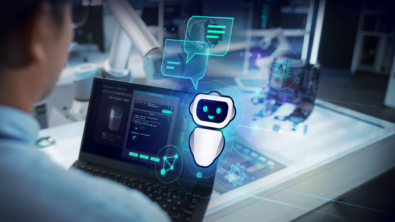The Industrial Copilot heralds the next generation of digital assistants

Designing and manufacturing products is a complex process with a wide range of knowledge and expertise required at every step from design to service. But, when ensuring all of that knowledge is available to those who need it, when they need it, is no simple task in and of itself.
In a recent podcast, Michi Lebacher and Alessia Bortolotti joined host Spencer Acain to examine the ways in which the Industrial Copilot, a powerful application of generative AI, is helping to not only address the challenges of bringing key information to those who need it, but also how AI is helping to build a true digital assistant that spans across every element of the design process.
Check out the full episode here, read the transcript here, or keep reading for some of the highlights of that conversation.
Understanding an assistant
The Industrial Copilot is an umbrella term, Alessia explains, for a family of AI five assistants meant to be deployed across the industrial value chain. Each copilot is targeted at a different stage of the design and manufacturing process, starting with design then moving to planning, engineering and operations before finishing with service. Each different AI is trained specifically to help with tasks at different stages of the design process and serve as a true virtual assistant to users at each of these different stages.
For example, the design copilot would have the ability to offer suggestions based on best practices and past design data learned from a companies own historical information and expert users to help guide a design process to an optimal result faster and more intuitively. At the same time, the operations copilot can help diagnose and repair a failing machine on the shop floor, interpreting error codes and diagnostic information into a concrete plan of action based on historical precedent and manuals that a technician can easily follow.
While the tasks and goals of these copilots might not share much commonality, what they do share is the way they provide an intuitive way to access and interact with the underlying information needed at each step of the industrial value chain. A generative AI powered copilot is the perfect natural language interface between the vast and complex underlying data of the industrial world and the people can use and benefit from it.
Applying AI across industries
As previously mentioned, the Industrial Copilot isn’t a single, all-encompassing, AI model but a collection of models specialized for different tasks. While one of the powers of a large language model is its ability to “learn” a huge quantity of data, by limiting its scope to a specific use case, such as design or operations, it’s easier to build a model that will provide accurate, relevant results in a specific situation.
Michi points out how, both within Siemens itself, and the industry at large, everything is siloed. AI is helping to breakdown those silos as well, in this case by developing models designed to work across different stages of the design process, helping develop synergies between teams and businesses units that would normally be very difficult to realize due to a need for extensive cross collaboration between domain experts. By leveraging the capabilities of AI, it’s possible to have these domain experts exist in a digital form instead, bringing together the best knowledge from every level of the industrial value chain to create a whole greater then the some of its parts.
It may seem like AI is poised to take over the world, replacing humans in a huge swath of jobs but, for the foreseeable future at least, AI will be taking the roll of an assistant, not a replacement. As an assistant however, AI promises to be a powerful asset for managing data and interfacing between people, machines and information in a way traditional computer systems can’t. With a wide range of capabilities, the Industrial Copilot is one such example of how AI is collaborating across disciplines and bringing a new wave of innovation to every level of the industrial value chain.
To find out more listen to the full episode here or read the transcript here.
Siemens Digital Industries Software helps organizations of all sizes digitally transform using software, hardware and services from the Siemens Xcelerator business platform. Siemens’ software and the comprehensive digital twin enable companies to optimize their design, engineering and manufacturing processes to turn today’s ideas into the sustainable products of the future. From chips to entire systems, from product to process, across all industries. Siemens Digital Industries Software – Accelerating transformation.


